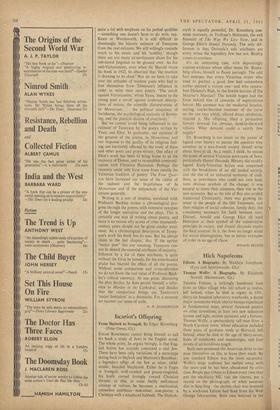Iscariot's Offspring
EDGAR ROSENBERG cannot bring himself to call his book a study of Jews in the English novel. The whole point, he argues bitingly, is that Eng- lish fiction has scarcely contained a real Jew. There have been only variations of a stereotype dating back to Shylock and Marlowe's Barabbas; a legendary effigy of the Jew as miser, child- stealer, bearded Machiavel. Either he is Fagin of Svengali, wolf-toothed and greasy-ringleted, his knife curved lovingly toward Christian throats; or else, in some feebly well-meant attempt at redress, he becomes a mechanical, colourless antithesis—non-miser, non-plotter, a Christian with a misplaced Sabbath. The Shylock- myth is equally powerful, Dr. Rosenberg con- tends morosely, in Trollope's Melmotte, the evil financier of The Way We Live Now, and in George Eliot's Daniel Deronda. The only dif- ference is that Deronda's sole attributes are every virtue the legendary Jew has not. Reality comes in nowhere.
It's an interesting case, with depressingly copious evidence whose sillier items Dr. Rosen- berg allows himself to flaunt jeeringly. The odd fact emerges that every Victorian writer who tried to portray a good Jew had somewhere earlier painted a vicious one--and who remem- bers Dickens's Riah, or the Jewish heroine of Du Maurier's Martian? The Jewish bogey had the force behind him of centuries of superstitious horror. His ancestor was the medieval Iscariot, staring, scarlet-bearded reminder of the curse on the one race which, offered direct revelation, rejected it. His offspring filled a permanent literary demand for obvious, dyed-in-the-wool villains. What demand could a saintly Jew supply?
Dr. Rosenberg is too 'intent on the power of legend over history to pursue the question why novelists in a non-Jewish society should write about Jews at all. As .a result, I think, he misses the point of several Victorian portrayals of Jews, particularly Daniel Deronda. History did modify legend. Early-Victorian fiction was concerned with the breakdown of an old landed society, and the rise of an industrial economy of cash. Jews, as newcomers who could not own land, were obvious symbols of the change; it was natural to stress their alienness, their rise in the new economy. But as the tide of flux also eroded traditional Christianity, there was growing in- terest in the people of the Old Testament, and their religion of social cohesion, family duty, the consistency necessary for faith between men. Disraeli, Arnold and George Eliot all used Hebraism as their symbol of the conservative principle in society, and Daniel Deronda marks the final reversal. In it, the Jews no longer stand for social disintegration, but as heroic examples of order in an age of chaos.
RONALD BRYDEN














































 Previous page
Previous page